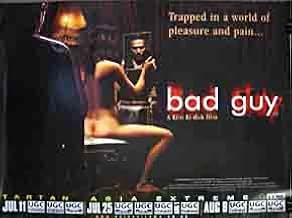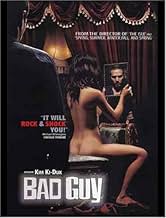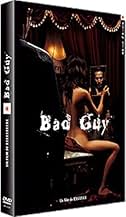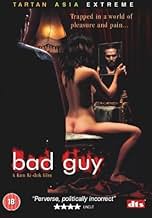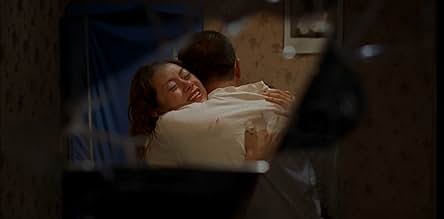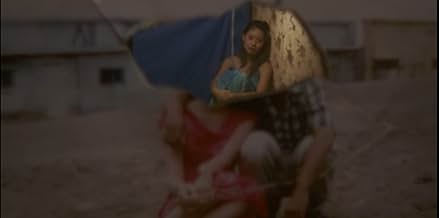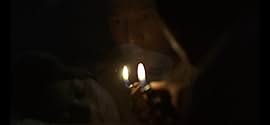Nappeun namja
- 2001
- Tous publics
- 1h 40m
IMDb RATING
6.6/10
11K
YOUR RATING
An unfeeling gangster seeks to ruin the life of a young girl who rejected him. He forces her into prostitution and spies on her regularly, then he soon begins to fall for her.An unfeeling gangster seeks to ruin the life of a young girl who rejected him. He forces her into prostitution and spies on her regularly, then he soon begins to fall for her.An unfeeling gangster seeks to ruin the life of a young girl who rejected him. He forces her into prostitution and spies on her regularly, then he soon begins to fall for her.
- Director
- Writer
- Stars
- Awards
- 4 wins & 3 nominations total
Kim Yun-tae
- Yun-tae
- (as Yun-tae Kim)
Kim Jeong-yeong
- Eun-hye
- (as Kim Jung-young)
Namgoong Min
- Hyun-soo
- (as Namkoong Min)
- Director
- Writer
- All cast & crew
- Production, box office & more at IMDbPro
Featured reviews
I saw this at the Melbourne International Film Festival (2002) and I think it's safe to say that it was the most uncomfortable and unpleasant cinematic experience I have ever had (and I loved 'La Pianiste'). One hour into it I was praying it would finish soon - I watched people leave the cinema with envy and regret. Only sheer bloodymindedness kept me sitting there until the end but I would have been happy if someone could have told me what happened. It left me with a nasty taste in my mouth that even large amounts of comfort food could not shift. It wasn't explicit in the way 'Baise Moi' was (although I could hardly watch one particular scene). No, what made it repulsive was how the story played itself out. The plot was wafer-thin after the girl joined the brothel and the film just seemed to go on and on. Dialogue and interesting characters - don't expect them here. I cannot comment on the artistic quality of the film - to me, a few interesting images do not a great movie make.
10sain11
This is an extremely good film - highly recommended. It will not be to everyone's taste, but if you are not afraid of thinking during a film then you should find plenty to take away from this one.
Bad Guy is a film based on the central premise of a relationship built between what is effectively a hostage-taker and his hostage. What transpires is a stream of abuses, power-shifts, emotional turmoil, love, hate, violence, sex, and almost every other aspect of life. This is an extremely original story, well told, with fascinating characters that are extremely human... both the good and bad sides of humanity.
The production values are very high, great acting, direction, cinematography, script, music, everything is top notch.
Typically, Korean films are very much based in real characters, social issues, and have an earthy approach that humanises their films beyond those of most countries. Bad Guy is no exception... while it is violent, confrontational, and decidedly dark, it bristles with underlying emotion and shows life without the rose coloured glasses.
The characters are at times extremely emotional, and at others almost entirely emotionally void as they struggle constantly to keep their balance in circumstances that are spiraling around them.
This is not an 'easy' film, in that it does not hand feed the viewer, there are no 'Jaws' style music queues to let you know when to be scared. You will need to work out how to feel for yourself with this one, which is fairly rare in this day and age.
As said earlier, this movie is not for everyone, however if the concept sounds like something that interests you, then you should enjoy this film. If on the other hand you don't like the idea of watching a film based on the idea of a man forcing a woman into a life of sexual servitude, then stay well away from this film.
Bad Guy is a film based on the central premise of a relationship built between what is effectively a hostage-taker and his hostage. What transpires is a stream of abuses, power-shifts, emotional turmoil, love, hate, violence, sex, and almost every other aspect of life. This is an extremely original story, well told, with fascinating characters that are extremely human... both the good and bad sides of humanity.
The production values are very high, great acting, direction, cinematography, script, music, everything is top notch.
Typically, Korean films are very much based in real characters, social issues, and have an earthy approach that humanises their films beyond those of most countries. Bad Guy is no exception... while it is violent, confrontational, and decidedly dark, it bristles with underlying emotion and shows life without the rose coloured glasses.
The characters are at times extremely emotional, and at others almost entirely emotionally void as they struggle constantly to keep their balance in circumstances that are spiraling around them.
This is not an 'easy' film, in that it does not hand feed the viewer, there are no 'Jaws' style music queues to let you know when to be scared. You will need to work out how to feel for yourself with this one, which is fairly rare in this day and age.
As said earlier, this movie is not for everyone, however if the concept sounds like something that interests you, then you should enjoy this film. If on the other hand you don't like the idea of watching a film based on the idea of a man forcing a woman into a life of sexual servitude, then stay well away from this film.
Kim Ki-duk's seventh movie could have been so much more. Romantising forced prostitution is not a very sensible decision. Lets face it the film is meant to be uncomfortable viewing, but by the end it was to much, and the final message put forth seemed a grave mistake - if you force sex on a girl enough she will eventually love you and stay with you forever even if she is still forced to sell herself (now thats shocking)!! As for the film making, in general it was disappointing, a horrible shaky POV shot to show a character's drunkenness - that is lazy film-making, and the use of bad music, added to the blatant romanticism of a serious issue. Some valid attempts made at portraying the nasty realism of the red light district were again undercut by cheesy romance! Although there is no doubt that Kim Ki-duk is a talented filmmaker (see 'Spring, Summer' for a fine example), this film showcases little of this.
With the work of South Korean filmmaker Kim Ki-Duk, the viewer has to accept some very fundamental "flaws" that inherently seem to be a part of his work in a practical sense. The production values are always cheap, the soundtrack music is always tacky, the acting is never more than at the most basic level, there are continuity errors... in a word, his films always seem low budget and as if everything were shot in one take. Also he has almost an insistence on breaching realism and lapsing into his own vague allegory. His characters never follow any kind of real internal logic, but rather act according to the scenario he conceives. All of these factors amount to the reason I don't think I will ever be able to consider any of his films true masterpieces.
That said, in return for accepting these inherent flaws, the viewer is rewarded with a candid, unadulterated look into the creative mind of a very interesting person. Kim Ki-Duk's vision is relentlessly idiosyncratic, but very consistent and pure. Watching his films, you gain direct access into his thoughts. This is not film-making by committee, this is "auteurism" in the truest sense. That in and of itself is such a rarity that his films are worth seeing for this reason alone. And this film, "Bad Guy", is probably the purest, most definitive example of Kim Ki-Duk's vision. All the preoccupations that manifest in his other work are here: The mute, inexpressive protagonist, the seeming obsession with prostitution and the degradation of women in general, and also the director's tendency to eventually lead his characters into an incomprehensible fantasy world. Whether or not the viewer is willing to accept these illogical flights of fancy is purely a matter of taste, but personally i find his work fascinating solely because it is so stubbornly idiosyncratic and fueled by a remarkably pure sense of creative expression.
That said, in return for accepting these inherent flaws, the viewer is rewarded with a candid, unadulterated look into the creative mind of a very interesting person. Kim Ki-Duk's vision is relentlessly idiosyncratic, but very consistent and pure. Watching his films, you gain direct access into his thoughts. This is not film-making by committee, this is "auteurism" in the truest sense. That in and of itself is such a rarity that his films are worth seeing for this reason alone. And this film, "Bad Guy", is probably the purest, most definitive example of Kim Ki-Duk's vision. All the preoccupations that manifest in his other work are here: The mute, inexpressive protagonist, the seeming obsession with prostitution and the degradation of women in general, and also the director's tendency to eventually lead his characters into an incomprehensible fantasy world. Whether or not the viewer is willing to accept these illogical flights of fancy is purely a matter of taste, but personally i find his work fascinating solely because it is so stubbornly idiosyncratic and fueled by a remarkably pure sense of creative expression.
"Bad Guy (Nabbeun namja)" is an earlier film of Ki-duk Kim that is probably being released now in the U.S. due to the success of "Spring, Summer, Fall, Winter... and Spring (Bom yeoreum gaeul gyeoul geurigo bom)," but fans of that visually entrancing parable should be warned how very different this exploration of the depths of human nature is.
The style has some similarity in that there is no exposition and we have to connect images that tell a tale of two very different people over time. Context is everything as voyeurism keeps repeating along a sexual spectrum of men and women together -- to romantic or erotic or degrading or lustful or violent, full of obsession or love or hate or longing or disgust, whether in prostitution, a relationship, or rape.
A key context is emotions and degrees, whether by the man or woman, or mutual, or drained of feeling such that I'm not sure love has any meaning in this film. There's a recurring use of Egon Schiele's erotic art to make some kind of comparative point about a continuum of sexual images and their effect on the viewer.
The titular character is reminiscent of Quasimodo of "The Hunchback of Notre Dame" fixating on Esmeralda if he were a psychopathic pimp in, I presume, Seoul's lurid red light district and played by the charismatic Jae-hyeon Jo, like an apolitical "Romper Stomper." I did get a little lost where he fit into the hierarchy of the yakuza-like gangster organization that controls the district, how much authority he has, and who was on top of whom to interpret their obsessions. Some of the encounters we see are presumably his limited fantasies as he miraculously recovers from various violently noble efforts to protect and reach out to the object of his affection that reminded me of the ambiguous ending of Jane Campion's "The Piano."
The film explores some of the same territory as the work of Catherine Breillat, but the context seems uneasily different when I'm the only woman in the theater and the director is male, perhaps because the central woman is always an object, even as she pitifully adapts to her various degradations, and even resists being freed from them. All the women in the film treat each other like the men treat them.
The style has some similarity in that there is no exposition and we have to connect images that tell a tale of two very different people over time. Context is everything as voyeurism keeps repeating along a sexual spectrum of men and women together -- to romantic or erotic or degrading or lustful or violent, full of obsession or love or hate or longing or disgust, whether in prostitution, a relationship, or rape.
A key context is emotions and degrees, whether by the man or woman, or mutual, or drained of feeling such that I'm not sure love has any meaning in this film. There's a recurring use of Egon Schiele's erotic art to make some kind of comparative point about a continuum of sexual images and their effect on the viewer.
The titular character is reminiscent of Quasimodo of "The Hunchback of Notre Dame" fixating on Esmeralda if he were a psychopathic pimp in, I presume, Seoul's lurid red light district and played by the charismatic Jae-hyeon Jo, like an apolitical "Romper Stomper." I did get a little lost where he fit into the hierarchy of the yakuza-like gangster organization that controls the district, how much authority he has, and who was on top of whom to interpret their obsessions. Some of the encounters we see are presumably his limited fantasies as he miraculously recovers from various violently noble efforts to protect and reach out to the object of his affection that reminded me of the ambiguous ending of Jane Campion's "The Piano."
The film explores some of the same territory as the work of Catherine Breillat, but the context seems uneasily different when I'm the only woman in the theater and the director is male, perhaps because the central woman is always an object, even as she pitifully adapts to her various degradations, and even resists being freed from them. All the women in the film treat each other like the men treat them.
Did you know
- TriviaDirector Trademark (Kim Ki-duk): Han-ki remains a mute character for much of the film.
- Crazy creditsThe last shot shows a truck with an orange cover going down a road in the distance. When the end credits begin, the truck becomes a small orange square that remains on the screen for the entire duration of the end credits.
- ConnectionsReferenced in Arirang (2011)
- SoundtracksI tuoi fiori
Written and Performed by Etta Scollo
- How long is Bad Guy?Powered by Alexa
Details
- Release date
- Country of origin
- Official site
- Language
- Also known as
- Bad Guy
- Filming locations
- Production companies
- See more company credits at IMDbPro
Box office
- Gross worldwide
- $62,100
- Runtime
- 1h 40m(100 min)
- Color
- Sound mix
- Aspect ratio
- 1.85 : 1
Contribute to this page
Suggest an edit or add missing content


